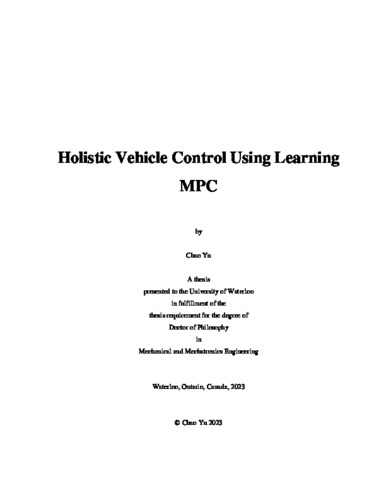UWSpace will be migrating to a new version of its software from July 29th to August 1st. UWSpace will be offline for all UW community members during this time.
Holistic Vehicle Control Using Learning MPC
| dc.contributor.author | Yu, Chao | |
| dc.date.accessioned | 2023-09-26 15:22:43 (GMT) | |
| dc.date.available | 2023-09-26 15:22:43 (GMT) | |
| dc.date.issued | 2023-09-26 | |
| dc.date.submitted | 2023-09-25 | |
| dc.identifier.uri | http://hdl.handle.net/10012/19955 | |
| dc.description.abstract | In recent years, learning MPC schemes have been introduced to address these challenges of traditional MPC. They typically leverage different machine learning techniques to learn the system dynamics directly from data, allowing it to handle model uncertainty more effectively. Besides, they can adapt to changes by continuously updating the learned model using real-time data, ensuring that the controller remains effective even as the system evolves. However, there are some challenges for the existing learning MPC techniques. Firstly, learning-based control approaches often lack interpretability. Understanding and interpreting the learned models and their learning and prediction processes are crucial for safety critical systems such as vehicle stability systems. Secondly, existing learning MPC techniques rely solely on learned models, which might result in poor performance or instability if the model encounters scenarios that differ significantly from the training data. Thirdly, existing learning MPC techniques typically require large amounts of high-quality data for training accurate models, which can be expensive or impractical in the vehicle stability control domain. To address these challenges, this thesis proposes a novel hybrid learning MPC approach for HVC. The main objective is to leverage the capabilities of machine learning algorithms to learn accurate and adaptive models of vehicle dynamics from data, enabling enhanced control strategies for improved stability and maneuverability. The hybrid learning MPC scheme maintains a traditional physics-based vehicle model and a data-based learning model. In the learned model, a variety of machine-learning techniques can be used to predict vehicle dynamics based on learning from collected vehicle data. The performance of the developed hybrid learning MPC controller using torque vectoring (TV) as the actuator is evaluated through the Matlab/Simulink and CarSim co-simulation with a high-fidelity Chevy Equinox vehicle model under a series of harsh maneuvers. Extensive real-world experiments using a Chevy Equinox electric testing vehicle are conducted. Both simulation results and experimental results show that the developed hybrid learning MPC approach consistently outperforms existing MPC methods with better yaw rate tracking performance and smaller vehicle sideslip under various driving conditions. | en |
| dc.language.iso | en | en |
| dc.publisher | University of Waterloo | en |
| dc.title | Holistic Vehicle Control Using Learning MPC | en |
| dc.type | Doctoral Thesis | en |
| dc.pending | false | |
| uws-etd.degree.department | Mechanical and Mechatronics Engineering | en |
| uws-etd.degree.discipline | Mechanical Engineering | en |
| uws-etd.degree.grantor | University of Waterloo | en |
| uws-etd.degree | Doctor of Philosophy | en |
| uws-etd.embargo.terms | 0 | en |
| uws.contributor.advisor | Khajepour, Amir | |
| uws.contributor.affiliation1 | Faculty of Engineering | en |
| uws.published.city | Waterloo | en |
| uws.published.country | Canada | en |
| uws.published.province | Ontario | en |
| uws.typeOfResource | Text | en |
| uws.peerReviewStatus | Unreviewed | en |
| uws.scholarLevel | Graduate | en |

